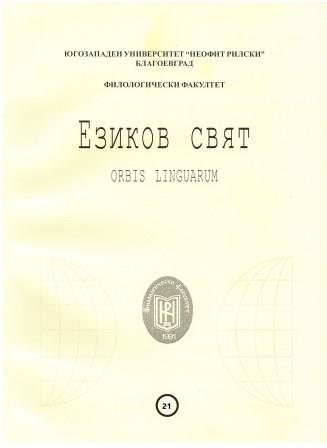НАБЛЮДЕНИЯ ВЪРХУ ФУНКЦИОНИРАНЕТО НА ОТРИЦАТЕЛНИТЕ ФОРМИ ЗА СЛЕДХОДНОСТ В СЪВРЕМЕННИЯ БЪЛГАРСКИ ЕЗИК
SOME OBSERVATIONS ON THE USE OF NEGATIVE FUTURE FORMS IN THE CONTEMPORARY BULGARIAN LANGUAGE
Author(s): Krasimira Angelova ChakarovaSubject(s): Language and Literature Studies, Theoretical Linguistics, Morphology
Published by: ЮГОЗАПАДЕН УНИВЕРСИТЕТ »НЕОФИТ РИЛСКИ«
Keywords: Modern Bulgarian; negative future forms; functional competition
Summary/Abstract: The focus of the academic analysis is on the issue of the functional competition between the negative future forms, formed with the negating formants не and няма (нямаше, нямало), in the contemporary stage of the development of the Bulgarian language. On the basis of a questionnaire survey, several questions were sought to be answered: which of the options is preferred by native speakers and what are the reasons for that; to what extent respondents distinguish the semantics of the consequential negative forms of non-evidentiality and epistemic conclusiveness. Another important task of the study is to provide up-to-date information on the functional realization of the negated consequential forms that have not found a place in the systematic descriptions of the Bulgarian language (cf. e.g. нямало е да чета, нямало е да съм чел и др.). The summarized results of the survey convincingly show that the existing intra-systemic competition between the negative post variants with не and няма (нямаше, нямало) in the modern Bulgarian language is distinctly chosen in favor of the formations with няма. On the other hand, it becomes clear that respondents distinguish between the meanings of renarrativity and epistemic conclusiveness in the paradigm of negated posteriority, but they are not always convinced who is the grammatically correct formal expresser of these meanings. The majority of native speakers express a preference for variants with a preserved (or dropped) third-person form of съм ‘to be’ – e.g. нямало е да четеш ‘you wouldn't have read’ (conclusive); нямало е да чета ‘(they say) I wouldn't have read’ (non-evidential), – which enters into a logically motivated correlation with the impersonal form нямало. Observations on the results of the survey have an important theoretical significance, insofar as they are related to the manifestations of the so-called tendency towards uniformity, characteristic of the Bulgarian morphological system.
Journal: Езиков свят - Orbis Linguarum
- Issue Year: 21/2023
- Issue No: 2
- Page Range: 015-023
- Page Count: 9
- Language: Bulgarian

